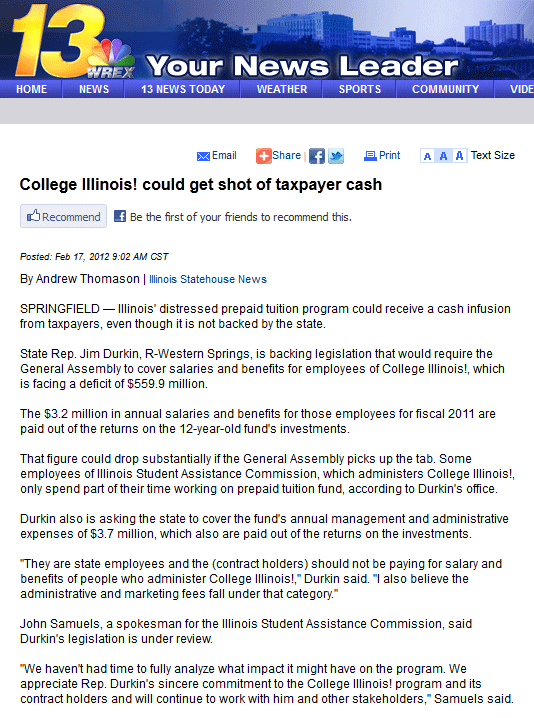Jim Tobin, A Friend Of Liberty (1945-2021)
May 2nd, 2022
Jim Tobin, President of Taxpayers United for America, is quoted in the following story from WREX 13 NBC.
 By Andrew Thomason | Illinois Statehouse News
By Andrew Thomason | Illinois Statehouse News
SPRINGFIELD — Illinois’ distressed prepaid tuition program could receive a cash infusion from taxpayers, even though it is not backed by the state.
State Rep. Jim Durkin, R-Western Springs, is backing legislation that would require the General Assembly to cover salaries and benefits for employees of College Illinois!, which is facing a deficit of $559.9 million.
The $3.2 million in annual salaries and benefits for those employees for fiscal 2011 are paid out of the returns on the 12-year-old fund’s investments.
That figure could drop substantially if the General Assembly picks up the tab. Some employees of Illinois Student Assistance Commission, which administers College Illinois!, only spend part of their time working on prepaid tuition fund, according to Durkin’s office.
Durkin also is asking the state to cover the fund’s annual management and administrative expenses of $3.7 million, which also are paid out of the returns on the investments.
“They are state employees and the (contract holders) should not be paying for salary and benefits of people who administer College Illinois!,” Durkin said. “I also believe the administrative and marketing fees fall under that category.”
John Samuels, a spokesman for the Illinois Student Assistance Commission, said Durkin’s legislation is under review.
“We haven’t had time to fully analyze what impact it might have on the program. We appreciate Rep. Durkin’s sincere commitment to the College Illinois! program and its contract holders and will continue to work with him and other stakeholders,” Samuels said.
The $1.1 billion fund allows residents to purchase tuition at a university or college for a child at the current rate. College Illinois! then invests that money with the hope that by the time the child is college-bound, the original investment and profits realized from the investment will cover the cost of tuition.
Questionable investments, the Great Recession and spiking tuition costs have created an unfunded liability in the fund of 30 percent, or $559.9 million.
Part of the uproar over College Illinois! is that investors said it was marketed as being backed by the state, meaning that even if the investments tanked, the state would rescue the fund.
In reality, College Illinois! is not backed by the state. The fund can ask the state for a bailout, but the Legislature doesn’t have an obligation to say yes.
Durkin said his legislation is the first of many steps needed to revive the program, but insisted that it isn’t the start of a much larger taxpayer bailout.
“There may be a time and a place down the road where we will have that discussion. I’m hoping to avoid that. I think that we can put our collective thoughts and our talent together to revise the program,” Durkin said.
Jim Tobin, president of Taxpayers United of America, a taxpayer watchdog group, called giving any taxpayer money to the ailing fund “dumb.”
The fund “shouldn’t be bailed out. It’ll just encourage more … improper investment decisions. It’s best for folks to save their money in the private sector, almost anywhere but with the government,” Tobin said.
Ginnie Flynn and her husband, Dan, bought two semesters for their oldest daughter. Ginnie Flynn said she appreciates the efforts to fix the fund, but she has realistic expectations about its future.
“My hope is the answer lies somewhere in the middle. I don’t think the state is going to 100 percent fix this. I don’t think investors are going to come out 100 percent unscathed,” Flynn said.
College Illinois! has enough assets to fund the program for the next decade. However, the last contract will expire in 2029, long after the fund runs dry if nothing changes.
Another solution to the fund’s crisis is for the state’s universities to give tuition discounts to College Illinois! students.
Colleges and universities, which are owed $880 million by the state already, have been lukewarm to that idea.
“We have lots and lots of needs so it would be difficult to give the College Illinois! students’ special” treatment, Rita Cheng, chancellor for Southern Illinois University at Carbondale. “We’d have to look at it on a case by case basis.”
Jan Dennis, a spokesman for the University of Illinois, the state’s largest university system, said the university knows of the idea of discounts but doesn’t have a position yet.